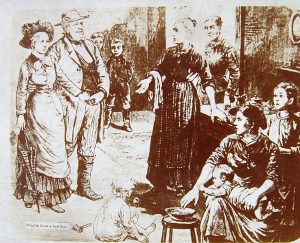“It might be good for you,” said my friend. “It’ll get you out and meet other people with similar values.”
I was lonely, and I liked the idea but I was hesitant. My friend was suggesting that I go to a Unitarian (mixed denomination) Christian women’s bible study group that was meeting once a week. They would have morning tea (describing sometimes tea, coffee, cake or fruit – not unlike brunch), watch episode of a list of many video series’ about the bible, then discuss.
I go to a Unitarian (mixed denomination) Christian women’s bible study group that was meeting once a week. They would have morning tea (describing sometimes tea, coffee, cake or fruit – not unlike brunch), watch episode of a list of many video series’ about the bible, then discuss.
I’ve been Mormon all of my life. I was hesitant. And fearful. And lonely. “We’re not the same denomination, but you’d be welcome,” my friend said. Was she sure? Mormons seem to have this idea that we aren’t welcome. We do our own service and own projects, but we don’t usually team up with other churches, especially other Christian churches. Still, I was lonely. So I went, possibly with a small, invisible chip on my shoulder—ready to be rejected.
Growing up Mormon, I heard a thousand stories about people in other denominations attacking Mormons and Mormon beliefs. Mormons were the victims in these stories—sometimes they were recent converts or people who had nearly been prevented from being baptised. Mormons were also the victors in these stories—miracle escapes, miracle revelations that converted entire congregations with their all-knowing biblical knowledge mixed with a Mormon doctrinal twist.
I quietly went in to the hall at the appropriate day and time. I brought a bottle of water (I don’t drink tea! I don’t drink coffee!) and refused the shared food. The female pastor warmed greeted me, and the voices around were friendly, though I kept everyone at a quiet arm’s length.
The first video started—a piece on Eve. I didn’t really like it. The gist was that Eve was disobedient, Adam was gallant to stay with her, etc. The traditional Eve story, one that I heard at church as a child. It was only when I went to seminary in Utah that I began to hear different ideas about Eve and her choice. But rather than interjecting Mormon gems—and fear alienating myself, I sat and listened. I wasn’t sure if I would go the following week—after all, weren’t they teaching false doctrine? But if they were, then – since I was taught this same thing at Mormon church—was I also a victim of false doctrine? My head was spinning between turning myself into a missionary story, and being present. In the end, I kept my mouth shut, and was present.
Though the doctrine reflected was not foreign, it still wasn’t comfortable. Nevertheless, I decided to go again the following week. I don’t recall who was being taught next—possibly Rebekah. But I loved the lesson. I loved the application of the points being taught, and I opened up and participated—just a little.
Possibly because we were studying women in the bible from a female perspective, much of what was being taught was new to me. Stories of faith, deliverance, spiritual depth, cultural applications and just plan women’s perspective – were beings discussed at length. Not a syllable was being discussed with a male perspective, unless it was to giggle about how men “didn’t get it.” Growing up Mormon, I had not experienced studying women in the scriptures as a topic in and of itself. And frankly, some of the LDS material that discussed biblical women was so typical, traditional and antiquated—that I did not crave learning about women.
In my Mormon upbringing, Deborah wasn’t *really* a “prophetess”—there was just no other word they had to use to describe her because language was so new, one Mormon male taught me. In the bible class, it was taught that Deborah was the most righteous and brave, so she was called as a prophetess. How can we be more like her? (This is sometimes taught in LDS tradition as well, but I have never heard it taught out loud at an actual church meeting).
In my Mormon upbringing, Elisabeth was infertile because she and Zachariah needed more faith to conceive. She is a side plot in a story of Mary’s immaculate conceptions—securing the position of fertility equals righteousness. But in this class, Elisabeth was not barren as a punishment, but because she was needed to be John the Baptist’s mother. She and her husband’s prayers were for the Christ, not for a son. Her pregnancy was her own story, after a life of righteous and worthy service to God. Zacharia’s shock was not at Elizabeth’s conception, but his shock that the Christ would soon be born *because* Elisabeth was carrying the man who would baptise Jesus. Elizabeth and her service were needed to help prepare the way for Christ. In other words, Elizabeth did not have a child in the world’s time because she had a greater calling to prepare the way for Christ, then to have a child in God’s time and raise that child in an ascetic household. Her fertility had nothing to do with her or her husband “finally” having enough faith. (The naming of John the Baptist seems to carry more weight in Mormon tradition that does the consideration of Elisabeth and Zachariah preparing the land for Jesus’ and John’s births.)
And more. I was thrilled. And stumped. After all—all of the stories I had been told in my youth were about how other religions “hated” Mormons. How Mormons lived their religion so much better…. Wasn’t I supposed to spew out Mormon doctrine, wow everyone and convert everyone in the room like Ammon? Or be a martyr because my views were right, but mocked, like Abinadi?
I decided that I was there to learn and follow the spirit. Because the spirit was there, and there is no monopoly on the spirit: where God is, the spirit abides.
 Then came the moment of truth. I became comfortable in making comments and participating within the group. I brought and shared food, shared tears in witness of Christ and Christian teachings. I was making a comment about how sometimes we (Christians? Mormons?) were treated differently because of our devotion….
Then came the moment of truth. I became comfortable in making comments and participating within the group. I brought and shared food, shared tears in witness of Christ and Christian teachings. I was making a comment about how sometimes we (Christians? Mormons?) were treated differently because of our devotion….
“But isn’t that more your perception because that is taught in your church?” came the statement.
I was dumbfounded. She didn’t say the word, “Mormon,” but I knew what she meant. In my time in Australia, Mormons seemed to seek the spotlight—seeking positive news stories about building temples, offering service—anything to build a positive “missionary presence.” But it seemed more for show—more about the sparkle of fool’s gold than in finding the diamond in the rough. I personally brought two investigators to church a few years prior to this when I was living in a ward, but no one else in the ward acknowledged the women with me. I brought a less active women with me to church another week, and was met with eye rolls, “You met the project…” they said of her—possibly because she had a drinking problem. And then there was my neighbour who had LDS in-laws and was investigating the church. She said when she spoken with the missionaries, she wasn’t interested, but when she spoke with me, she was interested in the church. I could not figure out for the life of me what the missionaries were teaching her. But after her father in law stated that his wife did not feel comfortable if he were to drive in a car alone with his daughter in law, she was done. “What kind of a person does she think I am?” she asked me, outraged. “Does she think I am going to hit on him—my husband’s father??? Like I am some kind of slut or something? There is something wrong with her and her church to teach that I am some kind of sex freak just because I am not Mormon. I mean, I needed a ride. WITH my baby.” She was indignant, and rightfully so. When my neighbour moved, she gave me a silver pot that her in-laws had purchased for her when they went on an LDS pilgrimage to Jerusalem. “Maybe you’d like it,” she’d said. “I think they saw it as something religious. I dunno. I don’t get it.” Neither did I.
So my investigators, less active friend, and my neighbour did not want to go back to Mormon Church with me. Because they weren’t welcome at Mormon church. But I had a strong suspicion that they would be welcome at this Unitarian church, just as I had been welcomed— self-righteous Mormon chip on my shoulder and all.
Mormons talked big and many worked hard. But still—the bravado of attendance and the appearance of propriety created a mask within Mormondom that even I felt obligated to adorn at Mormon church services. (This study is an interesting way to consider how religious groups might be more excluding that we like to think.) On a Mormon Missionary fast and testimony Sunday I attended around the same time I was going to these bible study lessons, all of the testimonies were about the wonderful missionary experiences people were having—yet, boldly obvious was the fact that no investigators were in the room. Missionary talk was big, attempting to humbly confess a missionary prestige that would elevate the ward member within the ward as the preferred result.
But not here. Not in this group. People spoke of sharing a testimony of Christ with others. But the end goal was not baptism; the end goal was sharing love. I learned so much about myself at the moment when I was asked if my ideas were formed by Mormonism, rather than Christianity. Because many of ideas are formed as a result of Mormon folklore, vibrato and teachings. And yet, my testimony of Christ is also founded in my Mormon upbringing.
It is a confusing mixture that I am still trying to balance. For now, I am still Mormon. And Christian. But I’ve taken the chip off of my shoulder, and am doing my best to place aside the folklore of bias that I was taught in my Mormon upbringing. Mostly, I hope the stories that I teach my daughters have less folklore and more Christlike love. As President Monson said this past April,
“…Let us examine our lives and determine to follow the Saviour’s example by being kind, loving, and charitable. And as we do so, we will be in a better position to call down the powers of heaven for ourselves, for our families, and for our fellow travellers in this sometimes difficult journey back to our heavenly home.”
How do you manage the folklore, exclusions policies (formal or informal), and incorrect stories that you are taught within the church?






5 Responses
Thanks for sharing this story, Spunky. I would love to go to a women’s Bible group like yours. I’ve read lots of feminist theology that elaborates women’s perspectives on various parts of the Bible, but I’ve never experienced the in-person community of a group like yours. How neat that you found them and found so much to think about there.
I relate to your experience so much, Spunky. I recently started attending a Unitarian congregation in tandem with still attending Mormon church services. There’s such freedom in communing with others who are not invested in my believing like them and only interested in being together to commune with the ineffible. I attended their Mother’s Day service that was devoted to the Feminine Divine. Hands down the best MD church experience I’ve ever had. Surprisingly it wasn’t everything I hoped it would be. But it left me feeling filled instead of empty and even pained as so many Mormon Mother’s Day services have in the past.
When attending graduate school at BYU I took a Women in the Scriptures class from Dr. Camille Fronk. It was empowering and disillusioning. So many strong, named women in the Bible compared to so very few in the Mormon scriptures.
Also, I really appreciate your sharing the insights you gained from examining the assumptions you feel you internalized growing up Mormon. That resonated so much as well! It was enlightening to hear how your fellow group member questioned you about this:
“…I was making a comment about how sometimes we (Christians? Mormons?) were treated differently because of our devotion….
‘But isn’t that more your perception because that is taught in your church?’ came the statement.”
That was enlightening to me as I reflected on how all the years I’ve lived in the Midwest or East Coast I have very rarely been mistreated or misunderstood because of my religious affiliation or beliefs. Yes, the moments I have been misjudged or discriminated against are seared in my memory because they were shocking and hurtful, but people are overwhelmingly accepting and engaging when I talk about my Mormon-ness. Thank you for sharing that moment!
What a wonderful post. Thank you! You just made me a little better of a person.
I really like this post, Spunky. I particularly like your point about the complexity of having learned things you’re not happy with in Mormonism, but also having learned of Christ there.